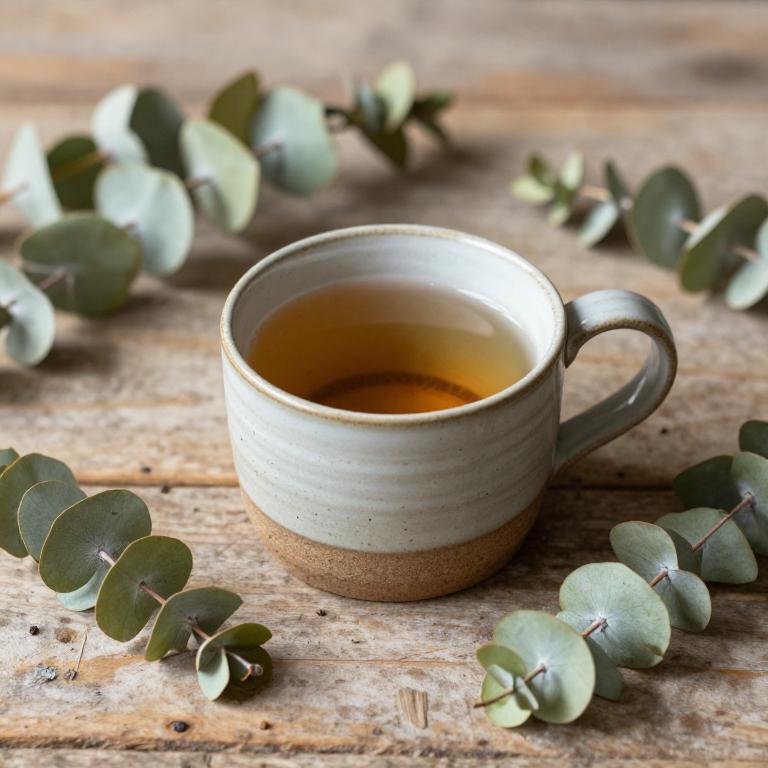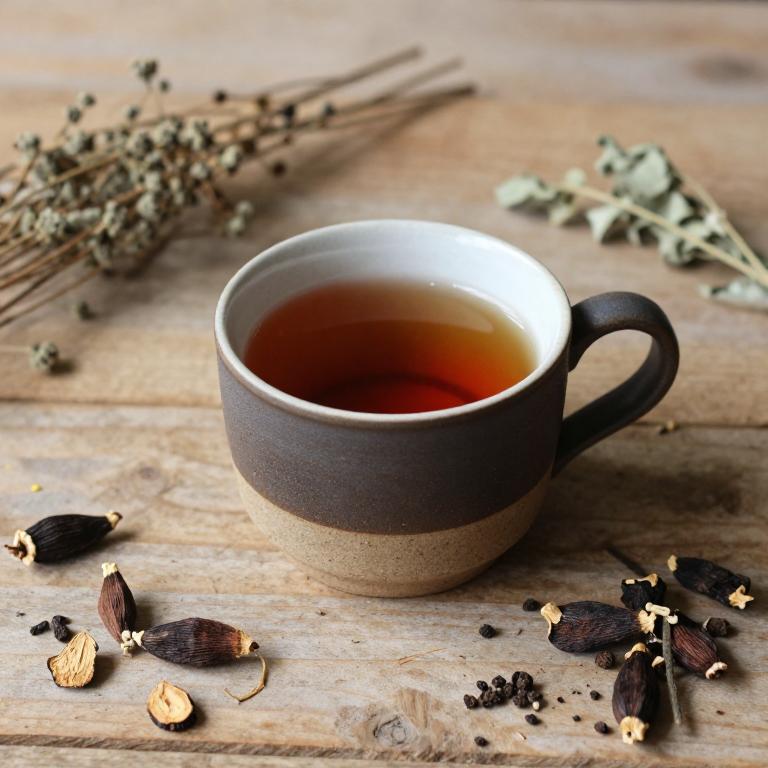10 Best Herbal Teas For Blocked Nose

Herbal teas can be an effective natural remedy for a blocked nose, offering gentle relief without the side effects of over-the-counter medications.
Chamomile, eucalyptus, and peppermint are among the most commonly used herbs for their decongestant and anti-inflammatory properties. These teas work by soothing the nasal passages and reducing mucus buildup, making it easier to breathe. To prepare, simply steep the dried herbs in hot water for several minutes, then drink slowly while inhaling the steam.
Incorporating herbal teas into your routine can provide a calming and soothing way to alleviate nasal congestion and support overall respiratory health.
Table of Contents
- 1. Eucalyptus (Eucalyptus globulus)
- 2. Salvia (Salvia officinalis)
- 3. Camellia (Camellia sinensis)
- 4. Chamomile (Matricaria chamomilla)
- 5. Ginger (Zingiber officinale)
- 6. Thyme (Thymus vulgaris)
- 7. Rosemary (Rosmarinus officinalis)
- 8. Black pepper (Piper nigrum)
- 9. Peppermint (Mentha piperita)
- 10. Stinging nettle (Urtica dioica)
1. Eucalyptus (Eucalyptus globulus)

Eucalyptus globulus, commonly known as eucalyptus oil, is often used in herbal teas to help alleviate symptoms of a blocked nose.
The tea works by stimulating the mucous membranes in the nasal passages, which can help reduce congestion and promote easier breathing. It contains compounds like eucalyptol that have decongestant and anti-inflammatory properties. Drinking eucalyptus globulus herbal tea can also soothe the throat and provide a refreshing, menthol-like sensation.
However, it is important to consult a healthcare professional before using it, especially for those with allergies or existing medical conditions.
2. Salvia (Salvia officinalis)

Salvia officinalis, commonly known as sage, has been traditionally used in herbal teas to help alleviate symptoms of a blocked nose.
The plant contains compounds such as rosmarinic acid and flavonoids, which possess anti-inflammatory and decongestant properties. When brewed into a tea, sage can help reduce nasal congestion by soothing the mucous membranes and thinning mucus. It is often recommended as a natural alternative to over-the-counter decongestants.
However, it is important to consult with a healthcare provider before using sage tea, especially for prolonged periods or in combination with other medications.
3. Camellia (Camellia sinensis)

Camellia sinensis, the plant from which green, black, and white teas are derived, is often used in herbal teas to support respiratory health.
While it is not a direct treatment for a blocked nose, some studies suggest that the antioxidants and anti-inflammatory compounds in Camellia sinensis may help reduce mucus production and soothe nasal congestion. Herbal teas made from Camellia sinensis, such as green tea, can be consumed warm to help ease breathing and provide a calming effect. However, it is important to note that these teas should not replace medical treatments for severe nasal blockage.
Always consult a healthcare professional before using herbal remedies, especially if symptoms persist or worsen.
4. Chamomile (Matricaria chamomilla)

Matricaria chamomilla, commonly known as chamomile, is a popular herbal tea often used to alleviate symptoms of a blocked nose.
Its anti-inflammatory and antispasmodic properties help reduce nasal congestion by soothing the mucous membranes in the nasal passages. Chamomile tea can also promote relaxation, which may indirectly improve breathing by reducing stress-related tension in the body. To prepare the tea, steep a teaspoon of dried chamomile flowers in hot water for several minutes.
While it is generally safe for most people, individuals with allergies to ragweed or related plants should use it with caution.
5. Ginger (Zingiber officinale)

Zingiber officinale, commonly known as ginger, is a popular herbal ingredient used in teas to help alleviate symptoms of a blocked nose.
Ginger tea works by stimulating the production of mucus, which can help to loosen congestion and clear the nasal passages. Its warming properties also help to soothe inflammation in the nasal tissues, reducing swelling and improving breathing. To prepare the tea, fresh or dried ginger root is typically boiled in water and then strained, often with the addition of honey or lemon for added comfort.
Regular consumption of ginger tea can provide natural relief from nasal congestion and support the body's natural healing processes during a cold or sinus infection.
6. Thyme (Thymus vulgaris)

Thymus vulgaris, commonly known as thyme, is a popular herb used in herbal teas to help alleviate symptoms of a blocked nose.
The essential oils in thyme, particularly thymol, possess strong antimicrobial and decongestant properties that can help reduce nasal congestion. When brewed into a warm tea, thyme can soothe the respiratory tract and promote easier breathing. Many people find that drinking thyme tea several times a day can provide relief from sinus pressure and a runny nose.
However, it is advisable to consult with a healthcare provider before using thyme tea, especially for those with allergies or underlying health conditions.
7. Rosemary (Rosmarinus officinalis)

Rosmarinus officinalis, commonly known as rosemary, is a popular herbal tea used to alleviate symptoms of a blocked nose due to its decongestant and anti-inflammatory properties.
The essential oils in rosemary, such as cineole and camphor, help to loosen mucus and reduce nasal congestion by stimulating the mucous membranes. Drinking rosemary tea can also promote circulation and ease respiratory discomfort, making it a natural remedy for sinus pressure and headaches associated with a stuffy nose. To prepare the tea, steep fresh or dried rosemary leaves in hot water for several minutes, and optionally add honey or lemon for enhanced flavor and additional soothing effects.
While generally safe, individuals with certain medical conditions or allergies should consult a healthcare provider before using rosemary tea regularly.
8. Black pepper (Piper nigrum)

Piper nigrum, commonly known as black pepper, is often used in herbal teas to help alleviate symptoms of a blocked nose.
The essential oils in black pepper, such as piperine, possess warming and decongestant properties that can help open up nasal passages. When brewed into a tea, black pepper can stimulate circulation and reduce mucus buildup, providing relief from congestion. However, it is important to use it in moderation, as excessive consumption may irritate the throat or stomach.
This herbal remedy is best used as a complementary treatment alongside other nasal decongestants and under the guidance of a healthcare professional.
9. Peppermint (Mentha piperita)

Mentha piperita, commonly known as peppermint, is a popular herb used in herbal teas to alleviate symptoms of a blocked nose.
The cooling and soothing properties of peppermint help to reduce nasal congestion by promoting mucus drainage and easing respiratory discomfort. Peppermint tea can be prepared by steeping fresh or dried leaves in hot water, making it a simple and accessible remedy. It also has a refreshing aroma that can help clear the airways and improve breathing.
While generally safe, individuals with certain health conditions should consult a healthcare provider before using peppermint tea as a remedy.
10. Stinging nettle (Urtica dioica)

Urtica dioica, commonly known as stinging nettle, is a herb that has been traditionally used for its potential health benefits, including alleviating symptoms of a blocked nose.
When brewed into a herbal tea, stinging nettle may help reduce inflammation in the nasal passages, providing relief from congestion. The plant contains compounds such as flavonoids and antioxidants that may support respiratory health and reduce mucus production. To prepare the tea, fresh or dried stinging nettle leaves are typically steeped in hot water for several minutes.
While some people find it beneficial, it is important to consult a healthcare professional before using it, especially if you have allergies or are taking other medications.